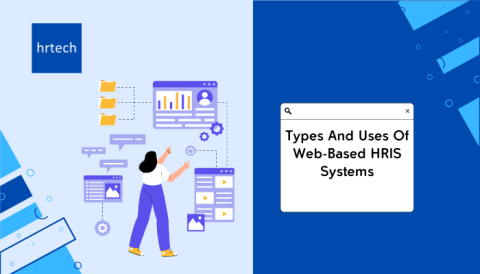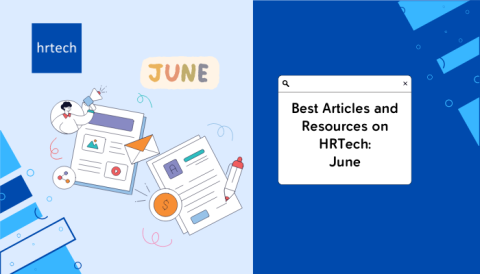Looking for a comprehensive guide on HRIS? Look no further. Our complete guide covers all aspects of HRIS benefits, functions, and more.
by Sriram Iyer, Founder & CEO, hrtech

What is HRIS?
HRIS is used to collect, store and manage data related to human resource functions within an organisation. This data is used through the end-to-end human resource management process. HRIS can automate and streamline various HR tasks, including recruitment, payroll, employee records management, performance evaluations, benefits administration, and more. The major benefit of deploying an HRIS is that it improves the efficiency and accuracy of HR operations and provides better transparency and access to information for managers and employees.
Benefits of HRIS
HRIS stores employee information centrally. A huge volume of employee data is then easily accessible in one place. Apart from easy accessibility, HRIS offers a wide range of business benefits.
- Increased Process Efficiency: HRIS automates various repetitive and time-consuming HR processes. This eliminates the time, resources and efforts required for manual data entry and repetitive administrative tasks. With smart automation, HRIS increases efficiency and improves the accuracy of various HR processes.
- Informed Decision-Making: HRIS stores and processes crucial employee data. It provides real-time data and analytics insights that can prove instrumental in making better-informed decisions. Moreover, the data generated by the system can be used to identify patterns and predict trends, enabling managers to make data-driven decisions.
- Compliance: To be compliant with GDPR regulations, employee data must be stored securely and should be accessible whenever required. HRIS helps you store information such as employee identification for scenarios involving theft, fraud, or misconduct; employee contact details for initial response in case of accidents; and employee identification data for tax purposes, as well as expiry dates for mandatory certification.
- Better Communication: HRIS can facilitate smooth communication between managers and employees by providing a centralized platform for sharing information, announcements, and updates. It can also enable employees to access their personal information and update their details as and when needed.
- Cost Efficiency: HRIS helps organisations save time, cost, resources and efforts by automating various processes and providing centralised access to HR data. It saves costs associated with paperwork, printing, storage, and administration. Additionally, it can help to reduce the risk of non-compliance with labour laws and regulations, which can result in hefty fines and legal fees.
- Enhanced Security: With security features such as password protection, authorised access controls, and data encryption, an HRIS ensures the confidentiality, integrity, and availability of HR data. The system also provides data backup and disaster recovery to restore data in unlikely events of system failure.
Functions of HRIS
Human Resource Information System has several functions that can support an organization’s HR operations. Some of the common functions of HRIS include:
- Applicant Tracking System: ATS handles an organisation’s recruitment needs. IT monitors candidate information and analyses resumes, assists recruiters in identifying top candidates and helps in streamlining the hiring process.
- Payroll: This function manages employee compensation, including tracking their work hours, calculating earnings, and processing payments. HRIS can automate payroll processing, making it more efficient and accurate.
- Benefits Administration: HRIS manages employee benefits, a crucial aspect of compensation. Some HRIS systems offer an employee self-service model, where employees can choose the benefits they want, such as increased paternity leave or paid time off.
- Time & Attendance: The time and attendance function in HRIS refers to the management of employee working hours, attendance, and time-off requests within an organisation. This function includes activities like time tracking, attendance and leave management and compliance with labour laws and regulations.
- Training: HRIS helps identify the training needs of employees and design learning pathways. It also serves as a tool for training delivery through online courses and virtual instructor-led training. Moreover, HRIS evaluates the effectiveness of training programs, through assessment tools and performance metrics.
- Performance Management: It refers to the management of employee performance, including goal setting, performance tracking, feedback, and evaluation within an organisation. HRIS looks after performance activities like goal setting, performance tracking and evaluation, feedback, and refresher training recommendations.
- Succession Planning: HRIS helps in identifying high-performing employees and potential successors for key positions, allowing organisations to develop and retain their top talent. It creates a reliable talent pipeline for sustainable growth of the organisation.
- Employee Self-service: This function enables employees to manage their own personal information, benefits, and time off requests, among other things, without relying on HR personnel. This provides greater control and autonomy to employees and reduces the administrative burden on the HR teams.
- Reporting & Analytics: HRIS collects, processes, and analyses data to generate automated reports that provide valuable insights to HR leaders and help them in making better-informed decisions related to workforce planning, talent management, and organisational development.
How to Choose the Right HRIS for your Business
To leverage the many benefits that HRIS has to offer, it is necessary to choose the system that will suit your business needs the best. With a plethora of options available in the market today, choosing the right HRIS for your business becomes a tedious ask. Consider the following aspects to make your search for the best HRIS simpler:
- Identify your business needs: Before choosing an HRIS, you must assess your organisation’s HR needs, including practice areas such as payroll, benefits administration, performance management, reporting and analytics, and more.
- Determine your budget: The cost of the system will have a direct impact on the ROI. You need a system that offers the best features without burning a hole in your pocket. Consider your budget and the costs associated with implementing and maintaining an HRIS. Some HRIS systems are offered as software as a service (SaaS), while others require on-premise installation.
- Evaluate HRIS vendors: This can prove to be a tedious task since you will be required to research and understand the offerings of various HRIS providers. It is advisable to look for vendors with a proven track record, experience in working with clients from your industry, good customer support, and robust security and data protection measures.
- Evaluate HRIS features: Once you evaluate the HRIS features against your business needs, you get a fair idea about the potential of the system. Always look for features such as employee self-service, payroll processing, benefits administration, time and attendance tracking, and reporting and analytics.
- Analyse integration capabilities: Every organisation has an existing tech stack. The HRIS must be able to seamlessly integrate with your existing applications to ensure smooth implementation and workflow processes.
- Test a product demo: Ask for a product demo or a free trial to better understand the functionalities and system workflows. Test the HRIS system and evaluate the user interface and ease of use before making the final decision.
It is equally important to take buy-in from all the concerned stakeholders, including HR personnel, IT staff, higher management leadership and employees. You must ensure the chosen HRIS system meets their needs and expectations.
To help you better analyse and compare features of a wide range of HRIS providers, we have created a marketplace that serves as a one-stop solution for your HR tech needs.
About the Author:

Sriram Iyer is the founder & CEO of hrtech, a Singapore- headquartered #hrtech market development and analyst firm. A Human Resources practitioner with over two decades of experience, he is also a Certified Strengths Coach and a passionate #hrtech advocate. In his career, he has played leadership roles with the Singtel Group Enterprise and Nasdaq-listed Cognizant Technology Solutions.





